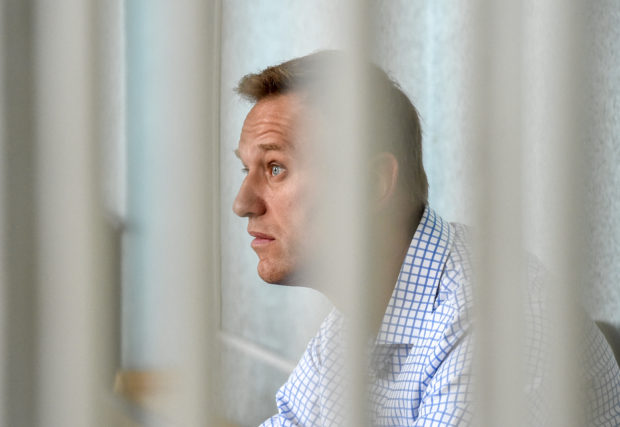
Russian opposition leader Alexei Navalny attends a hearing at a court in Moscow on June 24, 2019. – Alexei Navalny appears in court after taking part in unauthorized protest. (Photo by Vasily MAXIMOV / AFP FILE PHOTO)
BERLIN — The German government said Monday it was “fairly likely” that leading Russian opposition figure Alexei Navalny, who is being treated in a Berlin hospital, was poisoned.
The 44-year-old was brought to the German capital on Saturday from Siberia, where he went into a coma after falling ill on a flight with what Russian doctors have blamed on a metabolic disorder.
“We are dealing with a patient who is fairly likely was poisoned,” Chancellor Angela Merkel’s spokesman Steffen Seibert told reporters.
The Kremlin critic and anti-corruption campaigner, Russia’s best-known opposition figure, was rushed into intensive care on Thursday after his plane made an emergency landing in the Siberian city of Omsk.
His supporters have said they believe Navalny was poisoned with something in his cup of tea at the airport, pointing the finger of blame at President Vladimir Putin.
The Omsk regional health ministry has said that caffeine and alcohol were found in Navalny’s urine, but “no convulsive or synthetic poisons were detected”.
“The suspicion is… that somebody seriously poisoned Mr Navalny which, unfortunately, there are some examples of in recent Russian history, so the world takes this suspicion very seriously,” Seibert said.
‘Extensive diagnosis’
Navalny was flown to Berlin on a medical plane chartered by German NGO Cinema for Peace, an initiative financed by private donations.
The transfer came after Merkel extended an offer of treatment in Germany, saying news of Navalny’s condition had “truly upset me”.
Navalny is being treated in Berlin’s Charite hospital, where doctors have pledged to carry out an “extensive medical diagnosis” but have not yet given any public assessment of his condition.
Doctors treating him in Omsk initially refused to let Navalny leave but had a change of heart after his family and staff demanded he be allowed to travel to Germany.
Navalny’s spokeswoman Kira Yarmysh claimed Russia’s refusal to evacuate him was a ploy to “play for time” and make it impossible to trace poison.
At a press conference on Monday, doctors in Omsk denied they were pressured by officials while treating Navalny.
“There was no influence on the treatment of the patient a priori and there couldn’t have been any,” said Alexander Murakhovsky, the chief doctor at the Omsk emergency hospital No 1.
‘Many facts missing’
Jaka Bizilj, the head of the Cinema for Peace NGO, told Germany’s Bild newspaper he believed Navalny would survive but “the crucial question is whether he will survive this unscathed and continue to play his role”.
In any case, he would certainly be out of action politically “for at least one or two months”, Bizilj said, meaning he would miss key regional elections next month.
German foreign minister Heiko Maas said Monday that “more clarification is needed” on Navalny’s condition.
“There are still many facts missing, of a medical but also criminological nature, which we must wait for,” he said during a visit to Ukrainian capital Kiev on Monday.
Navalny is the latest in a long line of Kremlin critics who have fallen seriously ill or died in apparent poisonings.
He lost consciousness shortly after his plane took off on Thursday from Tomsk in Siberia, where he was working to support opposition candidates ahead of next month’s elections.
Yarmysh said he had seemed “absolutely fine” before boarding the flight and had neither drunk alcohol nor taken any medication.
She said she was sure he had suffered from an “intentional poisoning” and blamed Putin.
Navalny has made many enemies with his anti-corruption investigations, which often reveal the lavish lifestyles of Russia’s elite and attract millions of views online.
European Union leaders including Merkel and French President Emmanuel Macron have voiced concern for him after he faced repeated physical attacks and prosecutions.
The director of the Anti-Corruption Foundation that Navalny founded, Ivan Zhdanov, confirmed on social media that the organization was continuing its work.